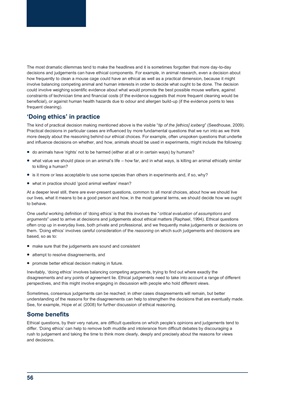
56
The most dramatic dilemmas tend to make the headlines and it is sometimes forgotten that more day-to-day
decisions and judgements can have ethical components. For example, in animal research, even a decision about
how frequently to clean a mouse cage could have an ethical as well as a practical dimension, because it might
involve balancing competing animal and human interests in order to decide what ought to be done. The decision
could involve weighing scientific evidence about what would promote the best possible mouse welfare, against
constraints of technician time and financial costs (if the evidence suggests that more frequent cleaning would be
beneficial), or against human health hazards due to odour and allergen build-up (if the evidence points to less
frequent cleaning).
"Doing ethics" in practice
The kind of practical decision making mentioned above is the visible "tip of the [ethics] iceberg" (Seedhouse, 2009).
Practical decisions in particular cases are influenced by more fundamental questions that we run into as we think
more deeply about the reasoning behind our ethical choices. For example, often unspoken questions that underlie
and influence decisions on whether, and how, animals should be used in experiments, might include the following:
do animals have "rights" not to be harmed (either at all or in certain ways) by humans?
what value we should place on an animal"s life - how far, and in what ways, is killing an animal ethically similar
to killing a human?
is it more or less acceptable to use some species than others in experiments and, if so, why?
what in practice should "good animal welfare" mean?
At a deeper level still, there are ever-present questions, common to all moral choices, about how we should live
our lives, what it means to be a good person and how, in the most general terms, we should decide how we ought
to behave.
One useful working definition of "doing ethics" is that this involves the "critical evaluation of assumptions and
arguments" used to arrive at decisions and judgements about ethical matters (Raphael, 1994). Ethical questions
often crop up in everyday lives, both private and professional, and we frequently make judgements or decisions on
them. "Doing ethics" involves careful consideration of the reasoning on which such judgements and decisions are
based, so as to:
make sure that the judgements are sound and consistent
attempt to resolve disagreements, and
promote better ethical decision making in future.
Inevitably, "doing ethics" involves balancing competing arguments, trying to find out where exactly the
disagreements and any points of agreement lie. Ethical judgements need to take into account a range of different
perspectives, and this might involve engaging in discussion with people who hold different views.
Sometimes, consensus judgements can be reached; in other cases disagreements will remain, but better
understanding of the reasons for the disagreements can help to strengthen the decisions that are eventually made.
See, for example, Hope et al. (2008) for further discussion of ethical reasoning.
Some benefits
Ethical questions, by their very nature, are difficult questions on which people"s opinions and judgements tend to
differ. "Doing ethics" can help to remove both muddle and intolerance from difficult debates by discouraging a
rush to judgement and taking the time to think more clearly, deeply and precisely about the reasons for views
and decisions.